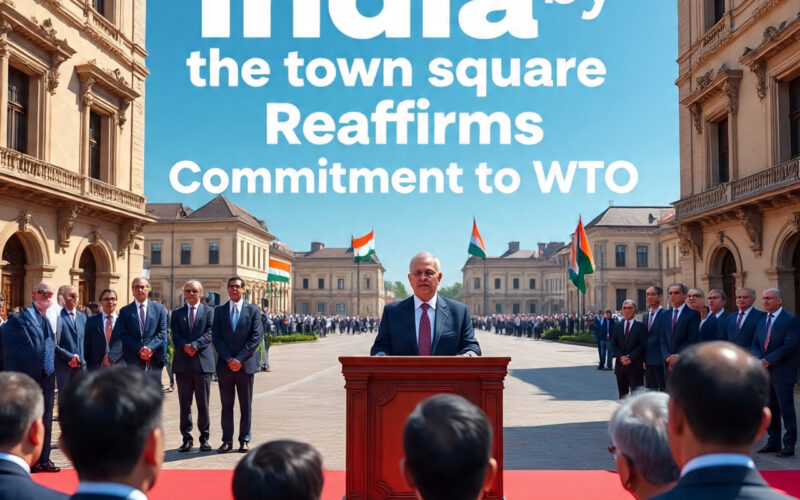#IndiaAtSCO #FairTrade #WTO #DigitalEconomy #SupplyChains #MissionLiFE #Sustainability #AVGC #UPI #ONDC #IndiaStack #InclusiveGrowth #GlobalTrade #SCO
Vladivostok – India has strongly reaffirmed its stand for a fair, transparent and inclusive multilateral trading system centred around the World Trade Organization (WTO), while highlighting the transformative potential of digital public infrastructure and sustainable development models at the Shanghai Cooperation Organisation (SCO) Trade Ministers’ Meeting held on September 6, 2025, in Vladivostok, Russia.
The meeting, attended by trade ministers and senior officials from SCO member states, focused on strengthening regional cooperation, building resilient supply chains, and promoting sustainable economic growth. Representing the Union Minister of Commerce & Industry, Shri Amitabh Kumar, Additional Secretary, Department of Commerce, underlined India’s vision for coordinated action and inclusive prosperity across the SCO region.
WTO-Centred Trading System
India reiterated that a development-focused, fair and non-discriminatory trade regime remains essential for global stability. It stressed the need for:
-
A permanent solution on Public Stockholding (PSH) for food security,
-
Stronger Special & Differential Treatment (S&DT) for developing nations,
-
And the restoration of a two-tier WTO dispute settlement system for impartial resolution of trade disputes.
According to the Indian delegation, the WTO-centred system is critical to ensuring transparency, predictability and equal opportunity for all economies, especially developing and least-developed countries.
Strengthening Trade and Supply Chains
Highlighting that the SCO represents 42% of the world’s population and 17.2% of global trade, India urged member countries to leverage this collective strength for shared prosperity.
Key points raised by India included:
-
The importance of export diversification to avoid overdependence on limited markets.
-
Building resilient supply chains through geographical spread, interoperable logistics and predictable market access.
-
Enhancing regional connectivity while upholding the principles of national sovereignty and territorial integrity.
India also cautioned against the misuse or weaponisation of export-related measures, which could artificially create scarcity, distort markets, or disrupt global supply chains. Instead, it called for transparent and calibrated policies that build trust and ensure equitable trade opportunities.
Digital Economy and Public Infrastructure
On the digital front, India proposed the creation of SCO workstreams that could foster cooperation in:
-
Fair and secure e-commerce frameworks,
-
Sharing of best practices in regulation,
-
And capacity-building for innovation-driven digitalisation.
India showcased its pioneering Digital Public Infrastructure (DPI) achievements, including:
-
UPI (Unified Payments Interface): a world-leading real-time payments system,
-
India Stack: identity and consent-based digital services,
-
ONDC (Open Network for Digital Commerce): a platform for unbundled, competitive, and inclusive e-commerce.
These were presented as low-cost, replicable models that can reduce transaction costs for MSMEs, expand cross-border market access, and facilitate real-time settlements, even through pilot projects among trusted SCO partners.
Sustainable Development and Climate Action
India also placed strong emphasis on sustainability and equity in trade-related climate policies. Reiterating the principle of Common but Differentiated Responsibilities and Respective Capabilities (CBDR-RC), it stressed that climate action must be accompanied by adequate financial support and affordable technology flows from developed to developing nations.
The delegation underlined India’s flagship Mission LiFE (Lifestyle for Environment) initiative, which promotes environmentally responsible consumption patterns. At the same time, India cautioned against unilateral trade-linked climate measures that may create arbitrary or unjustified discrimination under the guise of sustainability.
AVGC Sector: A Growth Engine
India also highlighted the vast potential of its AVGC sector (Animation, Visual Effects, Gaming, and Comics) as a driver of employment, exports, and innovation-led growth.
It recalled the successful hosting of the World Audio Visual and Entertainment Summit (WAVES 2025) earlier this year, which witnessed participation from over 100 countries. The Summit catalysed several initiatives, including:
-
Waves Bazaar – a global media collaboration platform,
-
WaveX – a funding mechanism for creative start-ups,
-
Creatosphere – a talent development platform through the “Create in India” challenge.
India also promoted its India Cine Hub initiative, supported by simplified regulations and 17 international co-production agreements, positioning the country as an emerging global hub for film production and creative industries.
Acknowledgment and Future Cooperation
India thanked the Russian Presidency of the SCO Council of Heads of Government for advancing a substantive trade and economic agenda. It expressed readiness to extend full cooperation under Tajikistan’s upcoming Chairmanship of the SCO (2026–27) to further promote sustainable, resilient and inclusive economic growth across the region.
Conclusion
India’s participation at the SCO Trade Ministers’ Meeting reinforced its commitment to a rules-based international trade order, resilient supply chains, digital innovation, and sustainable development. By showcasing its achievements in digital public infrastructure and creative industries, India positioned itself as both a responsible partner and an innovation leader within the SCO framework.
Suggested Hashtags:
#IndiaAtSCO #FairTrade #WTO #DigitalEconomy #SupplyChains #MissionLiFE #Sustainability #AVGC #UPI #ONDC #IndiaStack #InclusiveGrowth #GlobalTrade #SCO

